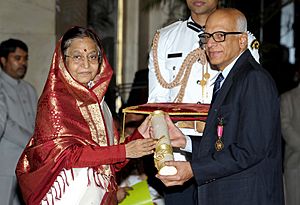M. S. Raghunathan facts for kids
Quick facts for kids
M. S. Raghunathan
|
|
|---|---|
| Born |
Madabusi Santanam Raghunathan
11 August 1941 |
| Nationality | Indian |
| Alma mater | University of Madras TIFR Institute for Advanced Study, Princeton |
| Awards |
|
| Scientific career | |
| Fields | Mathematics |
| Institutions | TIFR |
| Doctoral advisor | M.S. Narasimhan |
| Doctoral students | Vinay V. Deodhar Gopal Prasad |
Madabusi Santanam Raghunathan is a famous Indian mathematician. He is currently a special professor of mathematics in Mumbai, India. Before that, he led the National Centre for Mathematics. He was also a top professor at TIFR.
He earned his PhD in mathematics from the University of Mumbai. His teacher was M. S. Narasimhan. He is a member of important science groups like the Royal Society. He also received the Padma Bhushan award, a high honor in India. Since 2016, he has helped judge the Infosys Prize for math.
Contents
Early Life and School
Madabusi Santanam Raghunathan was born on August 11, 1941. This was in Anantapur, India. His family lived in Chennai. His father, Santanam, ran a timber business. He made it bigger by selling wood to Europe and Japan.
Raghunathan's father loved science. He often talked about it, making it fun for his children. Raghunathan's mother came from a family of academics. Her father was a respected English professor. He even wrote a book about William Makepeace Thackeray.
Raghunathan went to school in Chennai. He attended P.S. High School and Madras Christian College High School. He finished his SSLC exam in 1955. There is a funny story about this. After his Sanskrit exam, he accidentally took his answer paper home. A fellow student stopped him on his way. Luckily, his headmaster helped him avoid having to retake the whole exam.
The University of Madras had a rule. Students had to be at least 14 and a half years old to join. So, Raghunathan studied at St. Joseph's College in Bangalore from 1955 to 1957. Then he returned to Chennai. He joined Vivekananda College to study mathematics. This college had a very good reputation.
His Research Work
From 1960 to 1962, Raghunathan trained in mathematics. He then worked on a problem given by Professor M.S. Narasimhan. This problem was about "Deformations of linear connections and Riemannian metrics." He solved it by the summer of 1963.
He wrote his PhD paper under Professor Narasimhan's guidance. He received his degree in 1966. After his PhD, Raghunathan spent a year in Princeton, USA. Over the years, he has visited many universities. He has also spoken at several international math conferences. This includes the 1970 International Congress of Mathematicians.
His main research focuses on "Discrete subgroups of Lie groups." He has made important discoveries in this area.
Helping Mathematics Grow
Raghunathan has also played a big part in promoting mathematics. He has worked with many science groups. He helped organize the Ramanujan centenary celebrations in Chennai in 1987. This event brought together top number theorists.
His most important work was with the National Board for Higher Mathematics (NBHM). Raghunathan joined the Board in 1983. He became its chairman in 1987. He still serves in that role today. The Board does many things to help math.
- It gives money to math libraries.
- It supports research projects.
- It helps organize conferences.
- It helps mathematicians travel to events.
The Board also finds and supports young math talent. They do this through activities like:
- Math Olympiads.
- Mathematics Training and Talent Search programs.
- Scholarships for students at different levels.
Raghunathan also created a special "Nurture Programme." This program helps students learn math even if they choose other careers. He also organized the International Congress of Mathematicians (ICM 2010) in Hyderabad, India. This was the first time India hosted this big event.
Published Book
Raghunathan wrote a book called "Discrete Subgroups of Lie Groups." It was published in 1972. This book is now a classic in its field. It covers many important results. These results have been very useful in recent years. The book is highly valued and widely used. It has even been translated into Russian.
Images for kids
 | May Edward Chinn |
 | Rebecca Cole |
 | Alexa Canady |
 | Dorothy Lavinia Brown |



